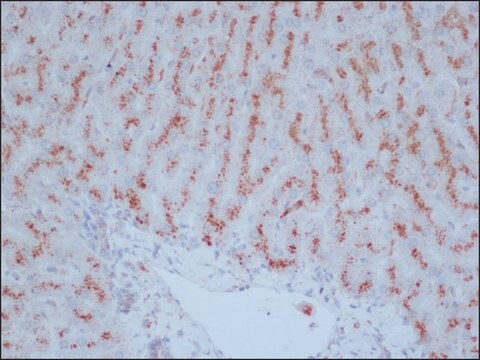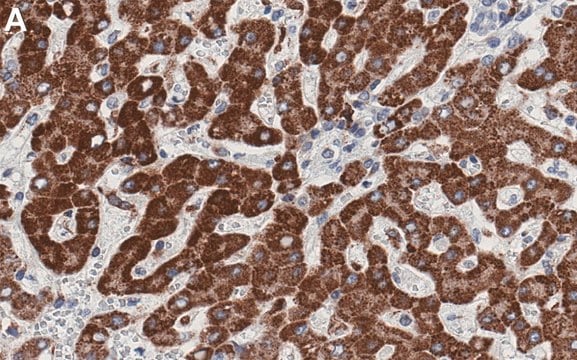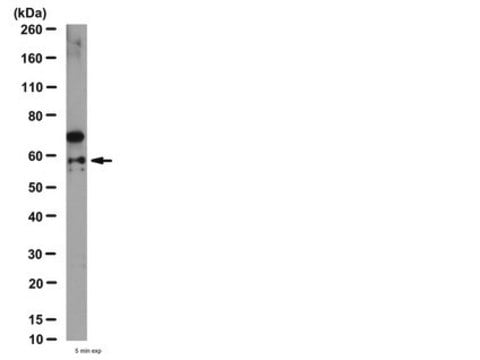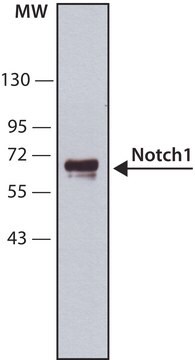おすすめの製品
由来生物
mouse
品質水準
結合体
unconjugated
抗体製品の状態
ascites fluid
抗体製品タイプ
primary antibodies
クローン
CTD-19, monoclonal
分子量
antigen 34 kDa
antigen 52 kDa (weaker band)
化学種の反応性
human
テクニック
immunohistochemistry (formalin-fixed, paraffin-embedded sections): 1:200 using human breast carcinoma tissue
indirect ELISA: suitable
microarray: suitable
western blot: 1:1,000 using human breast carcinoma cell line extract
アイソタイプ
IgG2a
UniProtアクセッション番号
輸送温度
dry ice
保管温度
−20°C
ターゲットの翻訳後修飾
unmodified
遺伝子情報
human ... CTSD(1509)
詳細
Cathepsins are lysosomal proteases that play an important role in the intracellular degradation of exogenous and endogenous proteins, in activation of enzyme precursors, and in tumor invasion and metastasis. They are normally localized in lysosomes of almost all mammalian cells, but under certain conditions they can be secreted from the cells.
Cathepsin D (CD, EC 3.4.23.5), an aspartyl endopeptidase, is induced by estrogen in certain estrogen receptor (ER)-positive breast cancer cell lines, but is produced constitutively by ER-negative cell lines. Cathepsin D is synthesized as a 52 kDa inactive precursor (pro-cathepsin D). Proteolytic removal of the amino-terminal 43 amino acid fragment and cleavage at an internal site results in an enzymatically active 48 kDa heterodimer consisting of two chains of 14 and 34 kDa.
The level of CD synthesized by cells is increased in response to mitogenic signals from estrogen, EGF, FGF, and IGF- I. The ability of tumor cells to invade the extracellular matrix has been attributed to cathepsins released by tumor cells or associated with the plasma membrane of tumor cells. CD is capable of digesting extracellular matrix proteins in in vivo models. Transfection of the CD gene into rat cells increases their tumorigenicity when injected into nude mice. Indeed, the concentrations of CD are significantly higher in breast carcinomas than in either normal breast tissues or benign breast tumors.
Cathepsin D (CD, EC 3.4.23.5), an aspartyl endopeptidase, is induced by estrogen in certain estrogen receptor (ER)-positive breast cancer cell lines, but is produced constitutively by ER-negative cell lines. Cathepsin D is synthesized as a 52 kDa inactive precursor (pro-cathepsin D). Proteolytic removal of the amino-terminal 43 amino acid fragment and cleavage at an internal site results in an enzymatically active 48 kDa heterodimer consisting of two chains of 14 and 34 kDa.
The level of CD synthesized by cells is increased in response to mitogenic signals from estrogen, EGF, FGF, and IGF- I. The ability of tumor cells to invade the extracellular matrix has been attributed to cathepsins released by tumor cells or associated with the plasma membrane of tumor cells. CD is capable of digesting extracellular matrix proteins in in vivo models. Transfection of the CD gene into rat cells increases their tumorigenicity when injected into nude mice. Indeed, the concentrations of CD are significantly higher in breast carcinomas than in either normal breast tissues or benign breast tumors.
特異性
Monoclonal Anti-Cathepsin D reacts specifically with cathepsin D (34 kDa with a weaker band at 52 kDa) in immunoblotting. It is also reactive in ELISA and in immunohistochemical staining of formalin-fixed paraffin-embedded human tissue sections. The product does not react with bovine cathepsins D and B, nor with human cathepsins B, C, G, and H.
免疫原
ヒト肝臓カテプシンD。
アプリケーション
Applications in which this antibody has been used successfully, and the associated peer-reviewed papers, are given below.
Immunohistochemistry (1 paper)
Western Blotting (1 paper)
Immunohistochemistry (1 paper)
Western Blotting (1 paper)
Monoclonal Anti-Cathepsin D may be used for the localization of cathepsin D using various immunochemical assays such as ELISA, immunoblotting, and immunohistochemistry. Antibodies that react specifically with cathepsin D may be used to study the distribution of CD in human breast cancers and to relate its concentrations to various biochemical, histological, and clinical characteristics.
免責事項
Unless otherwise stated in our catalog or other company documentation accompanying the product(s), our products are intended for research use only and are not to be used for any other purpose, which includes but is not limited to, unauthorized commercial uses, in vitro diagnostic uses, ex vivo or in vivo therapeutic uses or any type of consumption or application to humans or animals.
適切な製品が見つかりませんか。
製品選択ツール.をお試しください
保管分類コード
10 - Combustible liquids
WGK
WGK 3
適用法令
試験研究用途を考慮した関連法令を主に挙げております。化学物質以外については、一部の情報のみ提供しています。 製品を安全かつ合法的に使用することは、使用者の義務です。最新情報により修正される場合があります。WEBの反映には時間を要することがあるため、適宜SDSをご参照ください。
Jan Code
C0715-.5ML:
C0715-BULK:
C0715-VAR:
最新バージョンのいずれかを選択してください:
試験成績書(COA)
Lot/Batch Number
Maria Qatato et al.
Frontiers in pharmacology, 9, 221-221 (2018-04-05)
Trace amine-associated receptor 1 (Taar1) has been suggested as putative receptor of thyronamines. These are aminergic messengers with potential metabolic and neurological effects countering their contingent precursors, the thyroid hormones (THs). Recently, we found Taar1 to be localized at the
Arezoo Daryadel et al.
The Journal of biological chemistry, 281(37), 27653-27661 (2006-07-25)
Macrophage migration inhibitory factor (MIF) is an important cytokine involved in the regulation of innate immunity and present at increased levels during inflammatory responses. Here we demonstrate that mature blood and tissue neutrophils constitutively express MIF as a cytosolic protein
Amrita Khakurel et al.
Methods in molecular biology (Clifton, N.J.), 2557, 349-364 (2022-12-14)
The Golgi-associated retrograde protein (GARP) complex is proposed to tether endosome-derived transport vesicles, but the exact function and mechanism of GARP action are not completely understood. To uncover the GARP function in human cells, we employ CRISPR/Cas9 strategy and knock
Kriti Singh et al.
Breast cancer research : BCR, 17, 27-27 (2015-04-08)
Current approaches to inhibit oestrogen receptor-alpha (ERα) are focused on targeting its hormone-binding pocket and have limitations. Thus, we propose that inhibitors that bind to a coactivator-binding pocket on ERα, called activation function 2 (AF2), might overcome some of these
Federica Mastroiacovo et al.
Molecules (Basel, Switzerland), 27(10) (2022-05-29)
The brain area which surrounds the frankly ischemic region is named the area penumbra. In this area, most cells are spared although their oxidative metabolism is impaired. area penumbra is routinely detected by immunostaining of a molecule named Heat Shock
ライフサイエンス、有機合成、材料科学、クロマトグラフィー、分析など、あらゆる分野の研究に経験のあるメンバーがおります。.
製品に関するお問い合わせはこちら(テクニカルサービス)








